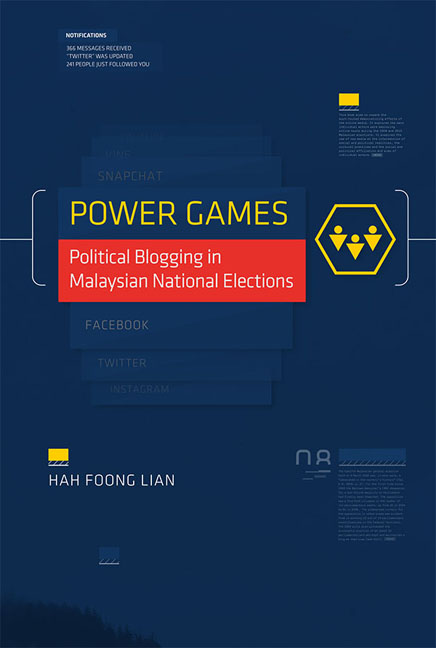Book contents
- Frontmatter
- Contents
- Acknowledgements
- List of Abbreviations of Political Parties
- Introduction
- Chapter 1 The Cultural, Social and Political Fabric of Malaysia
- Chapter 2 Trends in Social Media Use in Malaysian Cyberspace
- Chapter 3 A Political Marketing Tool and a Network of Cyber Battles
- Chapter 4 Psychological Warfare and Leadership Change
- Chapter 5 Negotiating Political Reform and Change
- Conclusion
- Bibliography
- Index
- About the Author
Chapter 5 - Negotiating Political Reform and Change
Published online by Cambridge University Press: 05 July 2016
- Frontmatter
- Contents
- Acknowledgements
- List of Abbreviations of Political Parties
- Introduction
- Chapter 1 The Cultural, Social and Political Fabric of Malaysia
- Chapter 2 Trends in Social Media Use in Malaysian Cyberspace
- Chapter 3 A Political Marketing Tool and a Network of Cyber Battles
- Chapter 4 Psychological Warfare and Leadership Change
- Chapter 5 Negotiating Political Reform and Change
- Conclusion
- Bibliography
- Index
- About the Author
Summary
This chapter examines a relatively distinct group of civil society bloggers who were actively blogging about the political landscape during the elections. This cluster of individuals described themselves as “independent” because they were not members of any political party. Many of the research participants were instead members of non-governmental organizations and they were blogging out of their own volition and interest. Although this group of bloggers did not belong to any of the political parties, most of them acknowledged that their aim was to remove the ruling regime with the hope that a change in government would bring about greater freedom and fairer policies in the country. An assessment of the ways they were using their blogs suggested that this group of bloggers was generally anti-establishment and leaned towards the opposition. They were neither “independent” nor “neutral” per se. Thus, it would be more appropriate to address this group of socio-political bloggers as “civil society bloggers” as opposed to “independent” bloggers.
Although many of the civil society bloggers interviewed for this research acknowledged that they were using their blogs to express their thoughts and fulfil their right to free speech, some of them did more than just propagate their views. Some of them initiated blog campaigns to generate public participation and make demands on the government, the mainstream media and the opposition. Evidence of blogging to generate public participation and make demands on the government could be seen from calls for support of protest rallies, such as Bersih and Hindraf in November 2007. In other instances the demands could be interpreted as a form of negotiation or bargaining between the blog campaigners and the various political parties contesting in the elections. An example was the blog campaign initiated by civil society blogger Haris Ibrahim, who launched two documents, parts of which were later turned into election manifestoes by the opposition parties during the 2008 election. The two documents were designed to seek the endorsement of political parties contesting the election. In return, the A-list blogger pledged support to any political parties that backed the documents. Other civil society bloggers participated and supported this campaign by linking the contents to their respective blogs or passing on the information to a wider audience. Similar campaigns were launched in the 2013 election. Among them were the “Anything But UMNO” and the “End BN” campaigns.
- Type
- Chapter
- Information
- Power GamesPolitical Blogging in Malaysian National Elections, pp. 147 - 172Publisher: ISEAS–Yusof Ishak InstitutePrint publication year: 2016

